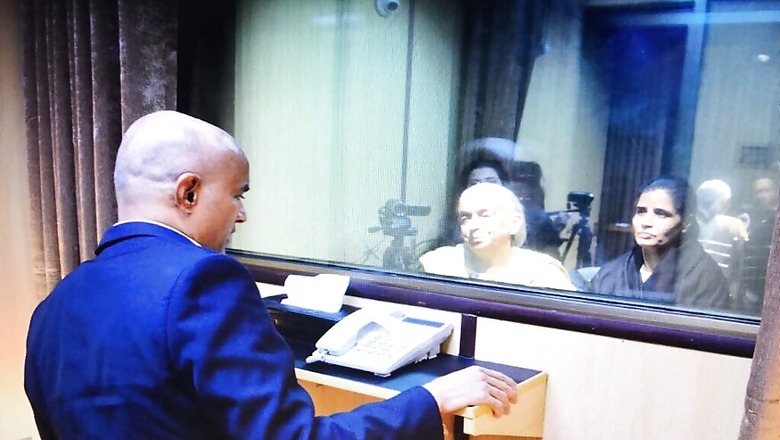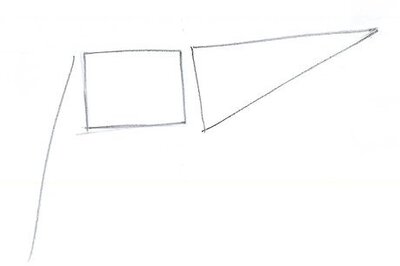
views
Kulbhushan Jadhav, whom Pakistani authorities have sentenced to death on the charges of espionage, terrorism and sabotage, met his wife and mother on December 25 at Pakistan Foreign Office, here in Islamabad.
Surrounded by cameras and journalists ready with their questions, Jadhav's wife and mother came out of a blue jeep, said ‘namaskar’, and steadily walked towards one of Pakistan Foreign Office's buildings where they met Jadhav.
Jadhav’s meeting with his wife and mother, which took place in a room that was dissected by a window mirror, is an opportunity for both India and Pakistan to improve their ties that have been strained for quite a while now.
"Pakistan has nothing to hide about the meeting,” said Pakistan Foreign Office. "Had we wanted the meeting to be a secret, we could have arranged it at any jail or some other place. We didn’t because we wanted the meeting to be open to the world. We have nothing to hide,” the Foreign Office added.
"The meeting of Jadhav was arranged on purely humanitarian grounds,” said Pakistani authorities.
It is also important to note that December 25 is celebrated in Pakistan as the birth anniversary of the founder of the nation, Muhammad Ali Jinnah. Jadhav's meeting with his family on this day also speaks about Islamabad’s intentions and resolve for peace.
But many in Pakistan and India wonder how could ties be mended when Jadhav has been sentenced to death by the Pakistani authorities already?
The signs at the moment from Islamabad are positive. It is imperative to note that Foreign Office of Pakistan categorically said that this would not be Jadhav's last meeting with his family.
Pakistan wants better relations with India and with other neighbouring states. Pakistan has embarked on a mega economic activity in collaboration with China that Islamabad thinks can benefit not just Pakistan but the neighboring countries like India as well, if India ever decides to benefit from it.
Pakistan is also aware of the fact that India is hostile towards the CPEC project. Any aggression towards CPEC can cost Pakistan much.
Therefore, Pakistan is of the view that confrontation and rift is not going to benefit either Pakistan or India, in future. Ultimately, the outstanding disputes and issues would require amicable settlements. Economy and trade between Pakistan and India can play a larger role in the region, if given a chance.
On both sides of the border, that dissects Kashmir and Punjab, people live in abject poverty. Many of them lack adequate health facilities and sanitation. Yet, both states are nuclear and armed to the teeth.
In times like these, Jadhav's case can either deteriorate the already strained relations or can be utilised as an opportunity for peace.
Though Pakistan's Foreign Office said that this is not Jadhav's last meeting with his family, it is too soon to answer how Islamabad would move forward with Jadhav and his death sentence.
What is more important is to see if Indian authorities would reciprocate Pakistan's initiative and both countries would seize the opportunity for peace.
Hanging Jadhav may not be in Pakistan's interest. Pakistan's equation is simple. Jadhav is an officer of the Indian Navy, who according to the Pakistani intelligence agencies, was involved in espionage, terrorism and sabotage. He is in Pakistan's custody, his group has been intercepted and Jadhav has been sentenced to death.
For Pakistan, at the moment it is enough to show it to the world that India has been instigating unrest in Pakistan; a country that has been fighting world's most notorious terrorist groups in the region, successfully. That is it. Any further development on Jadhav's case would be subject to India's response on it.
Jadhav's mercy plea is now with Pakistan's Chief of Army Staff. If the Chief cancels the mercy plea, then the request can be sent to the President of Pakistan, within 90 days. It is then for the President of Pakistan to decide Jadhav's fate on the issue. There is no time limit for the President of Pakistan to take decision. The decision from the President of Pakistan's office is not time bound, depending on what suits Pakistan.
Pakistan and India’s relations have been shaky. Nonetheless, there were efforts from both sides to mend ties in the recent past. Jadhav's episode can be crucial for the Pakistan-India relations. It can be utilized as a step forward towards peace or another setback for two nuclear states.
(The author is a defence analyst and TV presenter in Islamabad, Pakistan. Views expressed are personal.)















Comments
0 comment